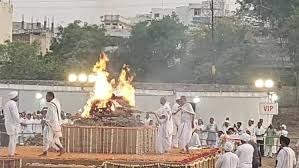1996 verdict watering down the charges against seven accused: Bhopal gas tragedy
NEW DELHI (IANS): The Supreme Court normally does not pass orders directing the framing of charges against accused under a specific provision of law, the apex court observed Wednesday.
‘Such orders are normally not passed by this court,’ said Chief Justice S.H. Kapadia heading a constitution bench which was hearing a petition related to the 1984 Bhopal gas tragedy case.
The constitution bench comprising Chief Justice Kapadia, Justice Altamas Kabir, Justice R.V. Raveendran, Justice B. Sudershan Reddy and Justice Aftab Alam was referring to its (apex court) Sep 13, 1996 verdict watering down the charges against seven accused in the Bhopal gas leak case.
The Central Bureau of Investigation (CBI) has filed a plea in the apex court to restore against the accused, including the then Union Carbide India Limited (UCIL) chairman Keshub Mahindra, the stringent charges of culpable homicide not amounting to murder, punishable with a maximum jail term of 10 years.
After the charges against the accused were diluted by the apex court in 1996, they were convicted by a Bhopal court last year under the less stringent provision of causing death due to negligence, carrying a maximum punishment of two years’ jail.
Chief Justice Kapadia asked senior counsel Harish Salve, appearing for Mahindra, what if in 1996 the apex court had passed the direction that the seven accused be tried under the stringent offence of culpable homicide not amounting to murder.
Salve said: ‘This would have been open to challenge. (On the grounds) You (apex court) are usurping the jurisdiction of the trial court.’
Chief Justice Kapadia said: ‘That is what my brother (Justice Alam) is saying that this court should not have ventured to the extent saying (directing) the framing of charges under Section 304A (less stringent offence of causing death due to negligence)’ against Mahindra and six others.
Resuming the arguments, Salve said that the binding nature of the (1996) judgment ended with the framing of charges in the trial court. However, the trial court could have looked into the fresh evidence for reframing of charges, Salve said.
The senior counsel said that the ’1996 direction of the apex court was not (intended) to bypass the Code of Criminal Procedure’.
If the trial court in the course of hearing stumbled on fresh evidence then it could have enhanced the charges, Salve argued.
The court said that when the apex court directs a magistrate he has no other option or way but to go by the top court’s order.
Justice Alam said: ‘Speaking for myself, if I am sitting in the high court, I will not touch the orders passed by the apex court.’Salve will continue the arguments next Tuesday.





